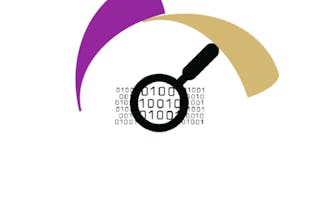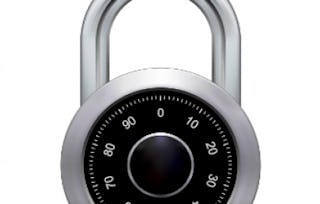A prominent expert in the number theory Godfrey Hardy described it in the beginning of 20th century as one of the most obviously useless branches of Pure Mathematics”. Just 30 years after his death, an algorithm for encryption of secret messages was developed using achievements of number theory. It was called RSA after the names of its authors, and its implementation is probably the most frequently used computer program in the world nowadays. Without it, nobody would be able to make secure payments over the internet, or even log in securely to e-mail and other personal services. In this course we will start with the basics of the number theory and get to cryptographic protocols based on it. By the end, you will be able to apply the basics of the number theory to encrypt and decrypt messages, and to break the code if one applies RSA carelessly. You will even pass a cryptographic quest!

Number Theory and Cryptography

Number Theory and Cryptography
This course is part of Introduction to Discrete Mathematics for Computer Science Specialization



Instructors: Michael Levin
42,115 already enrolled
Included with
609 reviews
Skills you'll gain
Details to know

Add to your LinkedIn profile
26 assignments
See how employees at top companies are mastering in-demand skills

Build your subject-matter expertise
- Learn new concepts from industry experts
- Gain a foundational understanding of a subject or tool
- Develop job-relevant skills with hands-on projects
- Earn a shareable career certificate

There are 4 modules in this course
In this week we will discuss integer numbers and standard operations on them: addition, subtraction, multiplication and division. The latter operation is the most interesting one and creates a complicated structure on integer numbers. We will discuss division with a remainder and introduce an arithmetic on the remainders. This mathematical set-up will allow us to created non-trivial computational and cryptographic constructions in further weeks.
What's included
8 readings11 assignments
This week we'll study Euclid's algorithm and its applications. This fundamental algorithm is the main stepping-stone for understanding much of modern cryptography! Not only does this algorithm find the greatest common divisor of two numbers (which is an incredibly important problem by itself), but its extended version also gives an efficient way to solve Diophantine equations and compute modular inverses.
What's included
7 videos4 readings7 assignments
Cryptography studies ways to share secrets securely, so that even eavesdroppers can't extract any information from what they hear or network traffic they intercept. One of the most popular cryptographic algorithms called RSA is based on unique integer factorization, Chinese Remainder Theorem and fast modular exponentiation. In this module, we are going to study these properties and algorithms which are the building blocks for RSA. In the next module we will use these building blocks to implement RSA and also to implement some clever attacks against RSA and decypher some secret codes.
What's included
11 readings6 assignments
Modern cryptography has developed the most during the World War I and World War II, because everybody was spying on everybody. You will hear this story and see why simple cyphers didn't work anymore. You will learn that shared secret key must be changed for every communication if one wants it to be secure. This is problematic when the demand for secure communication is skyrocketing, and the communicating parties can be on different continents. You will then study the RSA cryptosystem which allows parties to exchange secret keys such that no eavesdropper is able to decipher these secret keys in any reasonable time. After that, you will study and later implement a few attacks against incorrectly implemented RSA, and thus decipher a few secret codes and even pass a small cryptographic quest!
What's included
8 readings2 assignments2 ungraded labs
Earn a career certificate
Add this credential to your LinkedIn profile, resume, or CV. Share it on social media and in your performance review.
Instructors

Offered by
Explore more from Algorithms
 Status: Preview
Status: PreviewUniversity of Leeds
 Status: Free Trial
Status: Free TrialUniversity of Colorado System
 Status: Preview
Status: PreviewStanford University
 Status: Free Trial
Status: Free TrialUniversity of Colorado System
Why people choose Coursera for their career

Felipe M.

Jennifer J.

Larry W.

Chaitanya A.
Learner reviews
- 5 stars
69.29%
- 4 stars
20.36%
- 3 stars
5.41%
- 2 stars
1.64%
- 1 star
3.28%
Showing 3 of 609
Reviewed on Nov 30, 2020
Excellent course to learn number theory principles and relate them to asymmetric cryptosystems. The course is highly rigorous and challenging.
Reviewed on Feb 4, 2021
Thank you! enjoyed learning number theory, understood new concepts of modular programming, how public key -private key works and the basis of rsa algorithm.
Reviewed on Dec 8, 2018
Amazing course, learnt a lot. The assignments were a bit difficult [ and time consuming ] but they helped me gain a better understanding of the concepts.

Open new doors with Coursera Plus
Unlimited access to 10,000+ world-class courses, hands-on projects, and job-ready certificate programs - all included in your subscription
Advance your career with an online degree
Earn a degree from world-class universities - 100% online
Join over 3,400 global companies that choose Coursera for Business
Upskill your employees to excel in the digital economy
Frequently asked questions
To access the course materials, assignments and to earn a Certificate, you will need to purchase the Certificate experience when you enroll in a course. You can try a Free Trial instead, or apply for Financial Aid. The course may offer 'Full Course, No Certificate' instead. This option lets you see all course materials, submit required assessments, and get a final grade. This also means that you will not be able to purchase a Certificate experience.
When you enroll in the course, you get access to all of the courses in the Specialization, and you earn a certificate when you complete the work. Your electronic Certificate will be added to your Accomplishments page - from there, you can print your Certificate or add it to your LinkedIn profile.
Yes. In select learning programs, you can apply for financial aid or a scholarship if you can’t afford the enrollment fee. If fin aid or scholarship is available for your learning program selection, you’ll find a link to apply on the description page.
More questions
Financial aid available,


